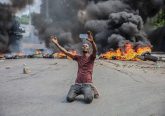Last week, the UK government voted, by a huge majority of 481 MPs, to engage in military action in Iraq. Now, once again, we are effectively at war in the Middle East.
For anyone committed to humanitarian inclinations, military force – so easily legitimated through hyperbolic statements of threat, and dramatic images of missiles precisely destroying targets through an aircraft’s gun-sights – should be treated with deep scepticism. Yet the tendency to reflexively reject and virulently condemn military action out of hand is no less lacking in critical reflection than the mindless swallowing of hawkish hyperbole.
The international community has rightly been condemned for standing by and allowing genocide to occur in Rwanda in 1994, and in Darfur in 2003. Is this a similar case? The unfolding and deepening disaster in Iraq seems very much of our own making; so will inaction make us again culpable in unspeakable human suffering? Or is the impulse to fight mere atavistic “war fever”?[1] To answer these questions we need to interrogate two more: first, is the threat of ISIS as great as is claimed? And second, will military action do any good?
Is ISIS as dangerous as is claimed?
Yes. Last week, a fellow member of the International Association of Genocide Scholars sent me a collection of high resolution colour photographs taken on the ground in areas of ISIS control. They are not fit for publication here, but words can scarcely convey the horror of these selfies from hell. One photo shows a pile of bruised, decapitated but so very human heads assembled on the street. In another, a smiling youth holds another decapitated, bloodied head towards the camera. Coupled with these are images more directly reminiscent of those grainy black and white photos on display in Holocaust museums throughout the world – lines of men kneeling in front of ditches, gunmen behind them about to shoot, or a row of bloodied corpses already keeled over into the ditch.
Accurate reporting on ISIS atrocities does not deserve to be dismissed, as Simon Jenkins did in The Guardian, as a ‘resort to adjectival hysteria, ISIS being variously repulsive, genocidal, atrocious, monstrous, unspeakable, satanic’ (Jenkins’ own serenely misguided advice is that we simply recognise that ‘these horrors pass’)[2]. The information behind such portrayals doesn’t come from the files of secret British and US intelligence services that we’re never allowed to see, but from the horrifying testimony of survivors, or those still trapped in areas of ISIS control. A 30-page Amnesty International report details recent ISIS mass killings, abductions, ethnic cleansing and forced conversions, emphasising that these amount to horrific war crimes under International Humanitarian Law.[3] The last two UN High Commissioners for Human Rights have condemned ISIS brutality,[4] as have the UN’s Special Advisor on the Prevention of Genocide, Adama Dieng, and the Special Advisor on the Responsibility to Protect, Jennifer Welsh.[5] Genocide Watch, a monitoring and prevention NGO, has declared Iraq a Genocide Emergency, 78 international genocide scholars (full disclosure: including myself) have signed a letter to the United Nations Security Council and European Union warning of extreme risks of further mass atrocities in areas of ISIS control in Syria and Iraq. This is not to mention widespread rape and sexual abuse of women and children, or the abduction of children for use as ISIS fighters or informers.[6] ISIS brutality is real and unimaginably extreme – it isn’t media or political hysteria.
On top of this, up to a million refugees have fled their homes in Iraq to Syria, Turkey and Iraq’s Kurdish provinces. They cannot stay there indefinitely in miserable conditions, but nor can they return whilst ISIS remains in control. ISIS also remains entrenched near the Mosul Dam, destruction of which would result in devastating and deadly flooding in Mosul, a city of 1.5 million, downriver along the Tigris, and famine in much of the rest of Iraq. Or ISIS could manipulate the water and electricity governed by the dam to exert control over cities and areas dependent on it, as Saddam Hussein did when in power.[7] Air strikes carry a real risk of civilian casualties – which should be uppermost in our minds – but this is a tiny fraction of the civilian suffering likely to result from continued ISIS control.
Can military action help?
None of this means that military force will improve matters – air power is not the painless and efficient scalpel it is sometimes made out to be. But it is also not mere colour and movement, a ‘token gesture’ in Jenkins’ words. US strikes appear to have made a vital contribution to the lifting of the siege of Amirli at the start of September – the Northern Iraqi town in which 17,000 Shiite Turkomen were trapped in a state of humanitarian crisis and facing the prospect of massacre had ISIS forces overrun them. Before that, air strikes had been used to force ISIS away from trapped civilians on Sinjar Mountain, averting another humanitarian crisis, and the bulk of American bombing has been in the Mosul Dam area, seeking to destroy the military hardware ISIS need to try and retake the dam off Kurdish Pershmerga militias.
ISIS’ current strength is partly rooted in physical resources – military stockpiles and captured hardware and, perhaps more than anything, control over oil installations, the major source of the staggering $2 billion value of the organisation. Air strikes can, to borrow one verb used by President Obama, seriously ‘degrade’ ISIS’ power by targeting such physical power resources. For all the subsequent failures in state building, air power performed just such a successful and important role against the Taliban in Afghanistan and pro-Gaddafi forces in Libya, and it is not for nothing that the cessation of bombing has been the principal demand issued in ISIS hostage videos. Such degradation makes a serious difference to the huge suffering ISIS can inflict on civilian populations, and increases the chances of Iraqi, Kurdish and Syrian ground forces achieving individual victories against them on land.
Still, a major reservation voiced by sceptics or opponents of military action has been the lack of a ‘a credible long-term strategy’.[8] It’s hard to see how this provides good reasons to oppose military action, since eschewing air strikes doesn’t provide a credible long-term strategy either. But pressure should be placed on the other verb deployed by Obama to describe the ultimate intended effect of air strikes on ISIS: ‘destroy’. Whilst air strikes can degrade ISIS and push it back towards its former existence as a terrorist network and armed militia rather than a powerful quasi-state, they cannot destroy it. Air strikes will be useless without progress in the ground war – for which Kurdish, Iraqi and Syrian rebel forces require vastly greater support in terms of hardware if not actual troops.
That is why debate is now likely to shift to whether the US and its allies should actually deploy ground forces. It’s difficult to place confidence in air strikes alone achieving an acceptable outcome, even if they are vitally needed. It may not involve a full deployment – but the use of special forces, as in Libya, or some front-line brigades, will be possible. At the root of this crisis is the immense state weakness of Iraq created by the Iraq War, and a realistic solution to that problem needs high outside support.
A proper strategy on Syria is also needed. The US government has continuously reiterated its refusal to co-operate or co-ordinate action with the Assad government in Syria; but it is vital to appreciate that intervention against ISIS is an intervention in the Syrian civil war, whether one wants it to be or not. If the never-ending cycle of short-term troubleshooting in the Middle East, which enable these successive crises, is going to end, a long running and expensive multi-pronged strategy is needed.
But whilst formulating that strategy is imperative, it isn’t a precondition for urgently needed, concrete, and meaningful action that stands a reasonable chance of averting wide-scale and horrific civilian suffering. ISIS has been repudiated and condemned by a remarkably wide range of international actors, from the US and European states to Saudia Arabia, the United Arab Emirates (both participants in air strikes) and Iran. There is some limited sense, at least, in which this really is a group whose actions shock the conscience of humankind. There are no good grounds for tub-thumping confidence or tunnel vision in trying to stop them, regarding any course of action. But try to stop them we must.
[1] http://www.theguardian.com/commentisfree/2014/sep/25/britain-new-iraq-war-doomed-token-gesture
[2] http://www.theguardian.com/commentisfree/2014/sep/25/britain-new-iraq-war-doomed-token-gesture
[3] Amnesty International, Ethnic Cleansing on a Historical Scale: Islamic State’s Systematic Targeting of Minorities in Northern Iraq (London: Amnesty International, 2014).
[4] http://www.ohchr.org/EN/NewsEvents/Pages/DisplayNews.aspx?NewsID=14961&LangID=E; http://www.ohchr.org/EN/NewsEvents/Pages/Media.aspx?IsMediaPage=true&LangID=E
[5] http://www.un.org/en/preventgenocide/adviser/
[6] http://www.reuters.com/article/2014/07/18/us-iraq-security-civilians-idUSKBN0FN0T720140718
[7] http://time.com/3126423/iraq-isis-mosul-dam-airstrikes/
[8] http://labourlist.org/wp-content/uploads/2014/09/Rushanara-Resignation-letter.jpg








2 Comments
The UK Parliament, not the government, voted. Also, this is a false dichotomy if ever there was one.